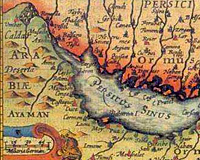Prior to the immigration of Aryans to Iranian plateau, the Assyrian sources referred to the Persian Gulf as "Narmarratu", meaning a bitter river, and this is the oldest name recorded for the Persian...
Prior to the immigration of Aryans to Iranian plateau, the Assyrian sources referred to the Persian Gulf as "Narmarratu", meaning a bitter river, and this is the oldest name recorded for the Persian Gulf.
An inscription of the Achaemenid king, Dariush the Great, refers toPersian Gulfas "Draya tya hacha parsa aity" which means a sea going away from the Perse.
Flavius Arrianus, the Greek Historian of the second century in his book Anabazis refers to it as "Persikon Kaitas".
Claudius Ptalemaeus, the great geographer of the second century referred to it as "Persicus Sinus" meaning exactly as thePersian Gulf.
In many living languages of the world the same name is used to refer to the Persian Gulf, in French Golfe Persique, in German Persischer Golf, in Italian Golfo Persico, in Russian Persidskizaliv, in Japanese Perusha wan and in Turkish Korfozi Farsi.
In Islamic historical and geographic sources, it is referred to as Bahre Fars, Albahre Farsi, Alkhalij alfars, Khalij Fars.
Abubakr Alhamedani known as Ibnalfaghih in his Mokhtassar Albladan says that "since connected, the Pars sea and the Indian sea are one sea."
Many other geographers and historians of Islamic period including Abu-Ali Ibn Rasteh, Aboul Qassem Khordad Khorrassani, Bozorg Hormozi, Abu Reihan Biruni have referred to the Persian Gulf with the like words.
https://iichs.ir/vdcj.8evfuqeio29zu.html
iichs.ir/vdcj.8evfuqeio29zu.html
